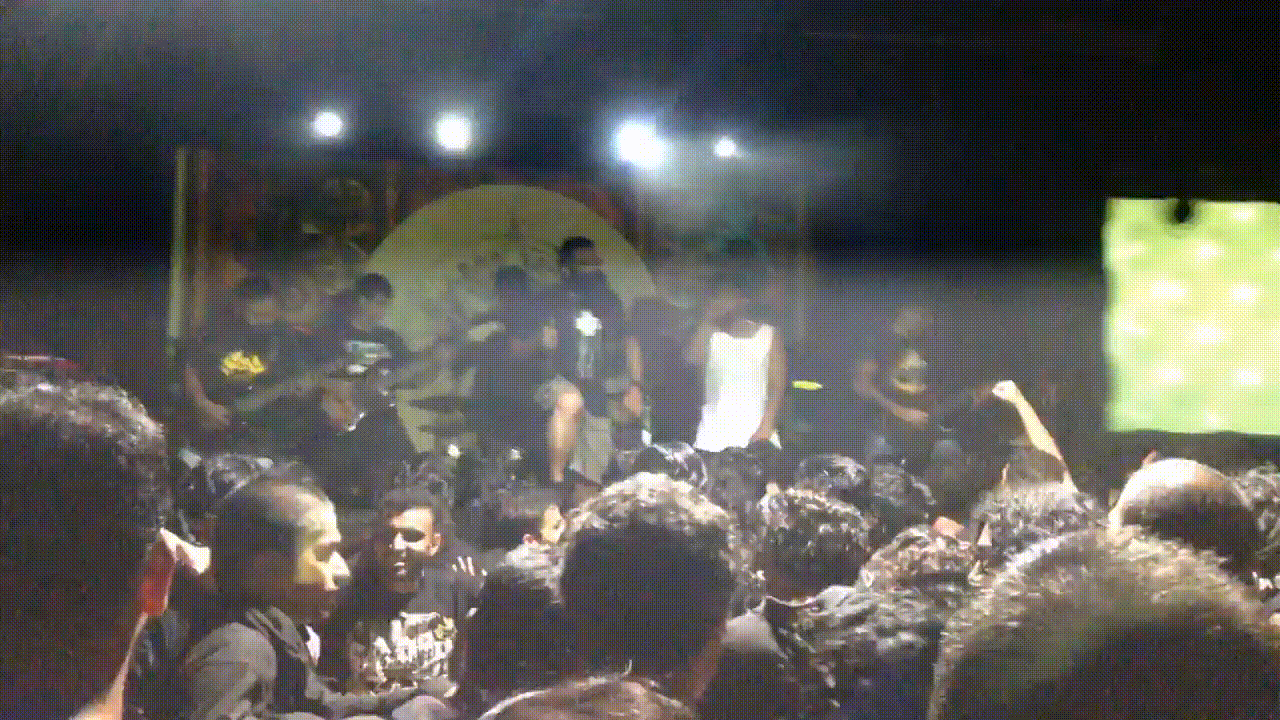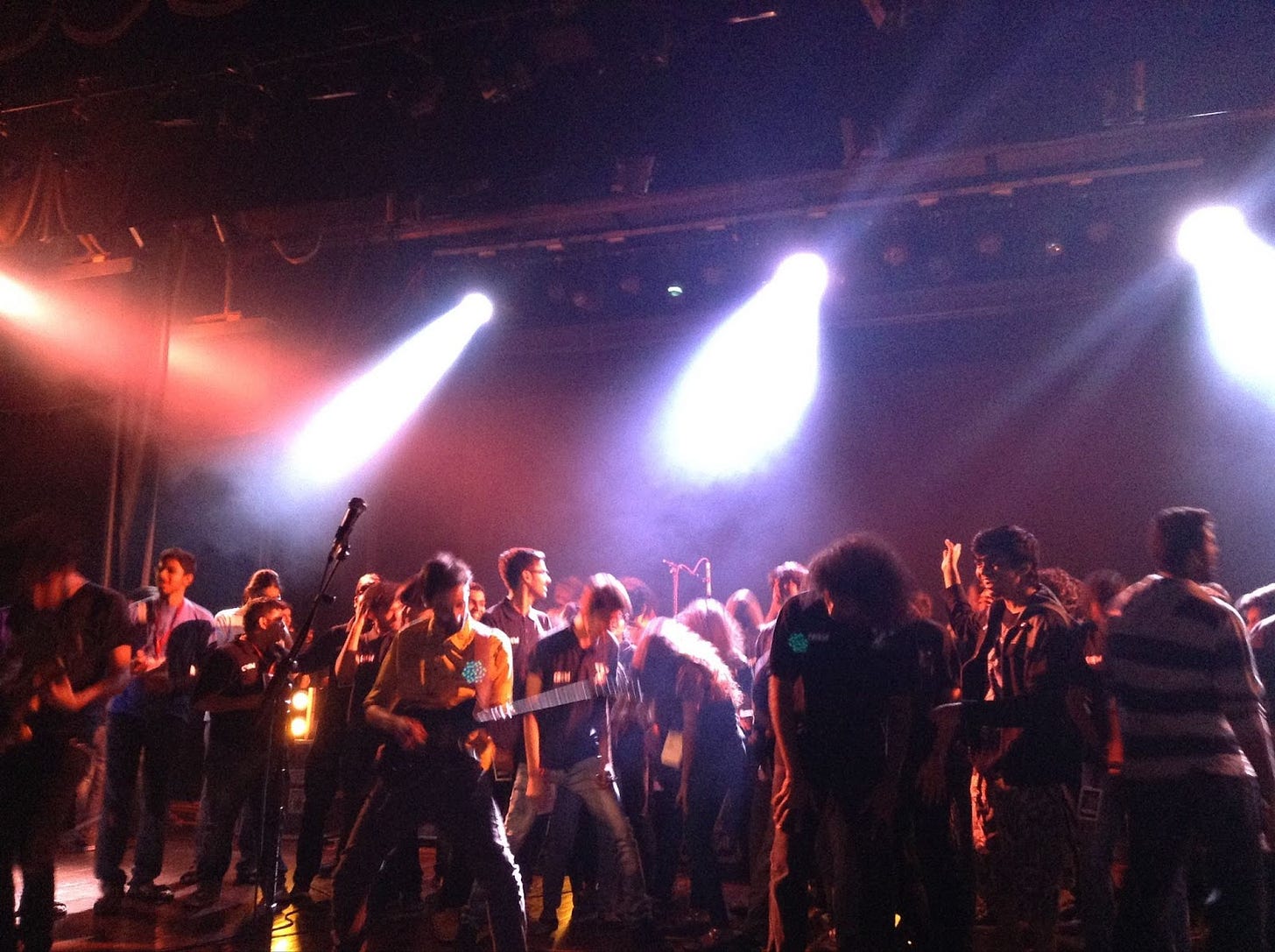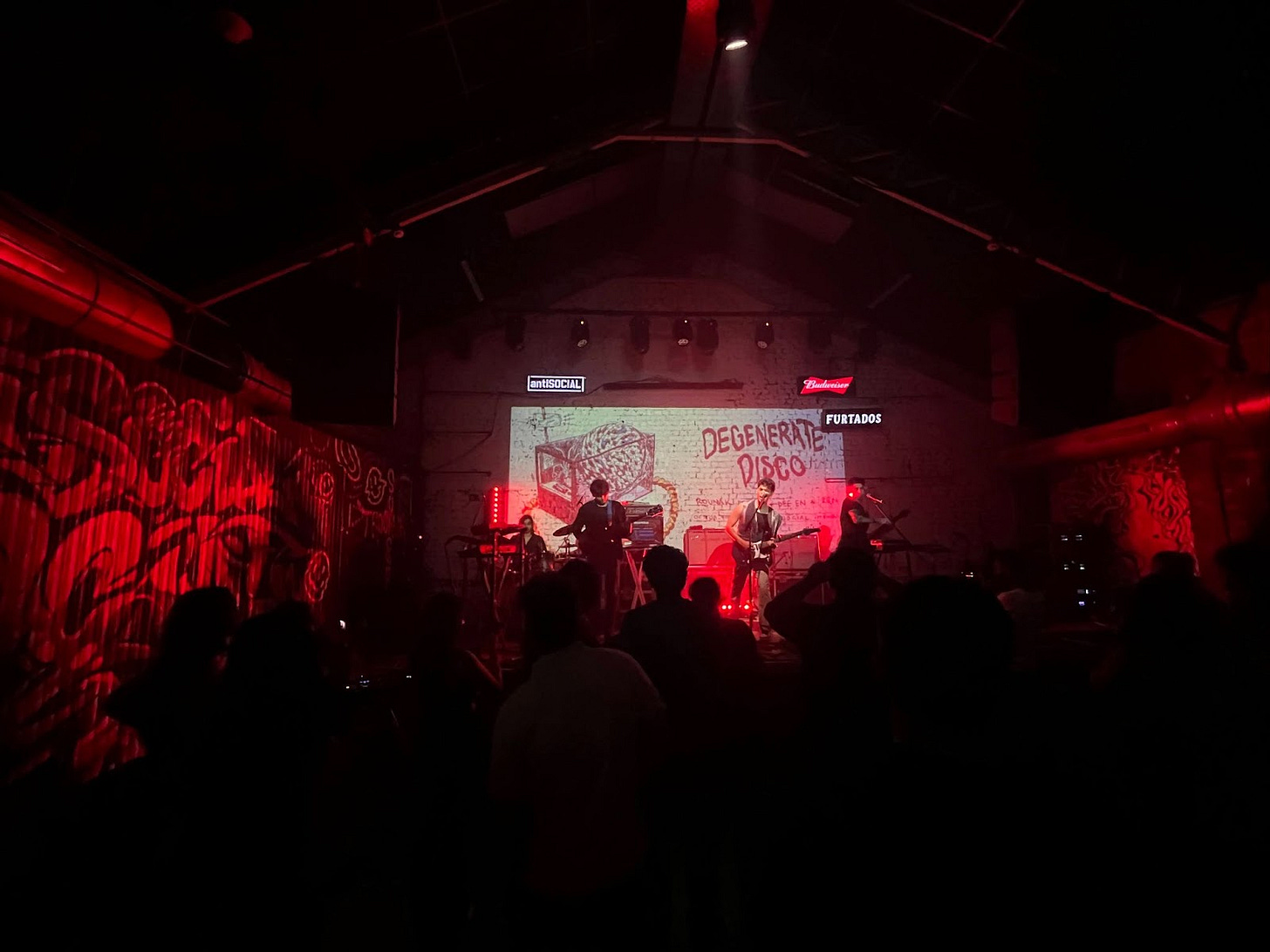Abandoning authenticity: The erasure of bands in Bombay
Sub-cultures have lost relevance in a post-meaning world
Bhenchod, madarchod— words thrown around on street corners, traffic jams and college classrooms — found a new home in the rock and metal scene of the early 2000s in Bombay. Originating as a chant of impatience and hostility, ‘bhenchod-madarchod’ soon grew into a mark of honour bestowed by audiences onto their favourite bands, the purest demonstration of adoration a band could receive. “It’s just a Bombay thing”, said Rajeev Talwar, frontman of Zero, a band that received, stoked and performed many bhenchod-madarchods over the past quarter-century. Bhenchod-madarchod chants were a voiceover for the Bombay scene, one that began to burgeon in the post-internet era of the early 2000s, and built the scaffolding for the now mammoth corporate machine, that is the music industry in Bombay and India. Despite its deep significance and its fingerprints on the largest festivals, IPs, and events that take place today, audiences today have deemed the music and the culture of that era obsolete.
In its nascency, the scene was driven by a spirit of subversion— a sort of siege mentality coupled with an optimism that collective action leads to some change. This ethos was necessary and powerful, forming a clear in- and out- group. The enemies were clear and required direct and violent opposition— Bollywood and its cousins’ chokehold on the entertainment industry, rent-seeking cops, a paucity of venues and audiences who only wanted covers of their favourite American/British bands. While the purpose of this larger movement is hard to crystallise, it was authentic. There was little financial or social capital to be gained from playing in a band, putting up shows or documenting them. It was born out of a burning passion and a literal rage against the powers that surrounded them. It is no surprise that Bulls on Parade has endured as one of the few permissible cover songs within the scene.
The scene’s style of music took the intangible authenticity and made it very literal. Rock and punk and metal are violent, aggressive and overpowering. The intention is to subsume, to be loud enough to drown out the hegemony of the world around. Distortion and double-bass were the sound of suburban rebellion. This heavy music held the scene together, providing an avenue for latent rebellion to manifest at long last, both for bands and audiences.

Being in this scene formed an intrinsic part of your identity. It meant far more than buying a ticket to a show or downloading an album. Halfway through a Kunj Gutka mosh-pit in Sitara Studios, you, for even a brief moment, felt like you were part of something real. That you were contributing to something larger (but not that much larger) than yourself, and that this was a worthy, noble fight that you were proud of partaking in. Finally, there was a community and with this community of black t-shirts and Old Monk, anything was possible. "I feel patriotic when I go to a festival. This is India. This makes me feel like I'm happy to be here", says Vishwesh Krishnamoorthy (frontman of Scribe) in Arjun S Ravi’s seminal documentary series "Standing By".
This promise of adventure and conceivable change had deep resonance, most visibly in colleges, specifically engineering colleges. The disaffection of the male engineering student, caused by continuous societal imposition through their childhood and early adulthood, found a medium and a purpose that was able to capture the confusion of hostel life. Through joints shared while listening to Tool (ask any engineer and they will know that Lateralus follows the Fibonacci sequence), torrented Slayer albums and trying to make sense of System of a Down’s lyrics, metal and rock spoke to the latent testosterone of an otherwise regimented, banal life. This group would go on to organise college festivals and competitions, creating an infrastructure for new generations of bands and audiences to find their feet.

The circuit of college festivals was the breeding ground for bands to ‘put the hard yards in’ and truly come of age— ironing out their sets after each competition, being prepared for inevitable technical issues, traversing the country with the hope of finally winning one competition— all as part of a rite of passage for a new band. The ugliness of this process further reinforced the authentic ethos of the "scene". The do-it-yourself (DIY) ethic, of independence and self-reliance, was intrinsic to bands, organisers, and their allies. This communal ethic helped realise unimaginable dreams for its participants, such as sharing the stage with international bands that had immeasurable influence on them. Take Mood Indigo, IIT Bombay's college festival, where the headliners from a similar period (2009 - 2012) were Porcupine Tree, Katatonia, Karnivool and Simple Plan— all legendary bands. Bands manifested an inner rage and belief that anything is possible. There were no blueprints or metrics to define success, let alone achieve it— there was simply a bias for action to make something from nothing.
"Without the wider community’s acceptance, creative pursuits lack the potential for commodification. There’s no point in preening yourself for success because it’s just not real. It’s a fairytale, so you may as well just do it in whatever way you like, good or bad, in your room or on the top of the Telstra building" – Pretty Flowers Grow in Shit by Nicholas Allbrook
The internet was also pivotal in allowing audiences to participate meaningfully in the scene, with platforms like GigPad acting as havens for gig reviews, often piercing but always honest. This underlying honesty and a capacity for dissent were tenets of a real scene, a self-regulating community, capable of disagreement and discourse, yet largely united. Metalwikileaks exemplified this best, as a blog about the metal community that gave back to it through satire, a reminder that no matter how bold the mission or how loud the music, to not take itself too seriously. They strengthened the collective fervour around the scene by poking fun at its participants.

7 years on from this post, in 2025, bands have now been relegated (with some exceptions) to havens outside mainstream relevance. A quick look at the Lollapalooza lineup in its three editions is telling of bands' fading relevance –

Equally concerning is the question of how a band is to play at Lollapalooza or an equivalent festival. Previous bands have followed the same logic as their college festival days, by playing smaller-scale gigs regularly, and eventually being booked for a larger festival. Yet the smaller scale gig (such as a headlining gig at antiSocial) is also near impossible to come by—

While multi-genre festivals like Lollapalooza and Echoes of Earth recognised that (Indian) bands have a low return on investment from a programming point of view, festivals like Outrage, (Mahindra) Independence Rock and Bangalore Open Air do offer some promises of scale to smaller bands, yet act in isolation, ‘othered’ into safe spaces for themselves.
This collective forgetting of bands is explained by a fundamental disconnect on which the scene is premised— authenticity. The real-ness in music and action of the Razz(berry Rhinoceros) and B69 scene was its cornerstone. This was a scene filled with intention and meaning, ascene you wore proudly on your sleeve in college or at the office. Finally, you belonged—it was you and your ramshackle troupe of black t-shirts against the world, and nothing else mattered.
Gen Z rejects the millennial logic of meaning-making through effort, instead opting for superficiality and cynicism. Their scepticism by-default of sub-cultures that require commitment is a result of a fluid identity formation process. Identity is now tied to the visual aesthetic, divorced from the ethos of that sub-culture, be it punk or rave or metal. The millennial promise of possibility through DIY is rejected. Everything that was to be done has been done, everything that was to be seen has already been seen, live-streamed and edited into 30-second clips. Participation is no longer about forging something new but about consuming and remixing aesthetics—a looping spectacle of nostalgia, where sub-cultures are fleeting, stripped of ethos, and reduced to a carousel of curated identities. Now that everything has been both seen and done, Gen Z is afforded the freedom to be whoever they want to be without the pressure of it meaning something, as it once did. And they choose all of the above, sometimes punk, sometimes emo, sometimes tradwife, sometimes tech-bro. This rabid construction of identity is a nihilistic coping mechanism in a world increasingly devoid of meaning.
At Degenerate Disco’s third edition, held at antiSocial in October 2024, young Pune-based band Ren played their first gig in Bombay, showcasing their latest EP from front-to-back. The EP itself was an atmospheric yet heavy, syncopated yet sparse, loud but clean release that made stellar use of the large room and solid sound system that night. By their own admission, their music draws both from the current state of metalcore music, as well as hyperpop, an outrageous combination indicative of a schizophrenic, everything-all-at-once generation, both as producers and consumers of music. Between the six tracks from their EP, however, Ren played two covers by the ‘niche band’ The 1975. Devoting a quarter of your debut set in a new city to covers is not criminal in isolation, but when contrasted with the generations before that fought endlessly to create space for original music, can be considered egregious. The band did not seem to recognise or value their privileged opportunity to play original music, a result of a culture war fought further south and north on Mumbai’s Western line, at Rang Bhavan and Razz, or just across the street at Sitara Studios. This violation of a fundamental tenet of the Millennial scene is further telling of the dissonance in values between two adjacent generations.
Cracks in institutions and power structures and the looming threat of AI-driven obsolescence have grown in Gen-Z a feeling of being “cheated” by previous generations. They gravitate towards a chaotic, buffet-style path to identity formation— largely aesthetic, and therefore meaningful enough to experience a sub-culture, even if fleeting. The myth of consistency and longevity, peddled by past generations, is simply untrue at a time where the world appears to be moving so quickly. The language of the Millennial scene too has been expunged from our minds and bastardised into marketing-speak. These words were symbols of purpose– ‘DIY'’ and ‘independent’ used to vocalise a stance against corporatism, ‘underground’ used to distinguish from a very real Bollywood-led mainstream. These words are now irrelevant and forgotten. Even ‘hipster’ or ‘scenester’, used sometimes pejoratively to describe participants the DIY scene have been reduced to their aesthetic value (with fashion trends like indie sleaze) and removed from their ideological origins.
Bhenchod-madarchod is also the title of a zine that pays tribute to the scene and culture that spawned it. One of the last few remnants of a scene that has passed, the BC/MC zine is perhaps more relevant than ever:
“So if you wanna put on a show, but don’t know how to build that into a business plan that a brand sponsor would sign onto, fuck them….if you’re an artist whose music is too out there to get on the bill at a major club, fuck them….If you wanna write about the music micro-scene you love, and no editor will commission you, fuck them…Because, regardless of size and scale, what matters is that you do or create something that reaches out and touches another person”
“We hope it inspires at least one of you to get off your ass, stop waiting for some corporate brand manager in Only Much Something or Book My Shit to book the act you love or create the gig lineup you want to see. Just get up and go do-it-yourself, dude”
—Bhanuj Kappal, BC/MC 2024
The flavour of disaffection and rage may have shifted, yet, as the everything-all-at-once generation inevitably fragments into abject confusion, a new spirit of negation/subversion will ignite, with its own set of enemies and uniforms, with their elbows out and horns up.





